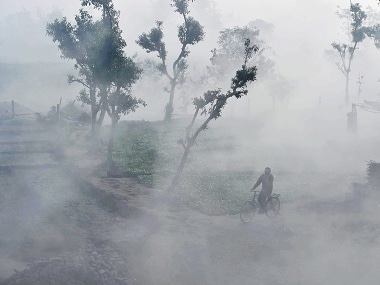This month is set to become the driest January in over a century, with just 2.2 millimetres of rain being recorded across the entire country in the first 30 days of the month, as against the normal average of 45.5 millimetres. To put this in perspective, the average January rainfall for Delhi alone is 19 millimetres. The prolonged dry spell, coupled with rising temperatures, could adversely impact the Rabi crop, media reports have said. [caption id=“attachment_4326989” align=“alignleft” width=“380”]  Temperatures in Delhi have been higher than normal. PTI[/caption] A report on The Times of India said this was the driest January since 2007, when 2.8 millimetres of rain was recorded. It said that western disturbances, which bring cold and wet weather into north India, have been more northerly than usual. As a result, instead of moving along northern Rajasthan and Punjab, they swept through Jammu and Kashmir, meaning the weather in states like Punjab, Rajasthan and Delhi have remained dry and warm. The report added that since records started being maintained in 1901, three out of the seven driest months of January have come since 2000. JR Kulkarni, retired meteorologist and All India Internet Weather Radio Station founder, was quoted as saying, “The general wind circulation goes into two phases — even and undulating. When the circulation is even, there is no interaction between the mid-latitude and tropical air, which happened this time. As a result, it rained less.” With the spectre of drought looming large over the middle and lower hills, the region’s Rabi crop target of 751.35 lakh MT will be hard to achieve, a report on The Tribune said, predicting the loss to be in the region of eight to ten percent as per preliminary assessments. Wheat is the main Rabi crop sown over 3.60 lakh hectares, and unless there is rain over the next few weeks of winter, the target of 6.70 lakh MT set for wheat production will be difficult to achieve, director of agriculture Des Raj Sharma was quoted as saying in the report, adding that the impact of dry weather was not much on vegetable, potato, oilseed and other crops. The report mentioned that the area under pulses has been increased from 8,000 to 12,500 hectares and production target has also been scaled up from 5,000 to 45,000 MT. Furthermore, the post-monsoon rain deficit was also high at 46 percent and there wasn’t enough moisture in the soil for germination of seeds and farmers are apprehensive that if the rain or snow do not occur, their seeds will go waste and it will be too late to sow the crop again.
This month is set to become the driest January in over a century, with just 2.2 millimetres of rain being recorded across the entire country in the first 30 days of the month, as against the normal average of 45.5 millimetres
Advertisement
End of Article


)

)
)
)
)
)
)
)
)



